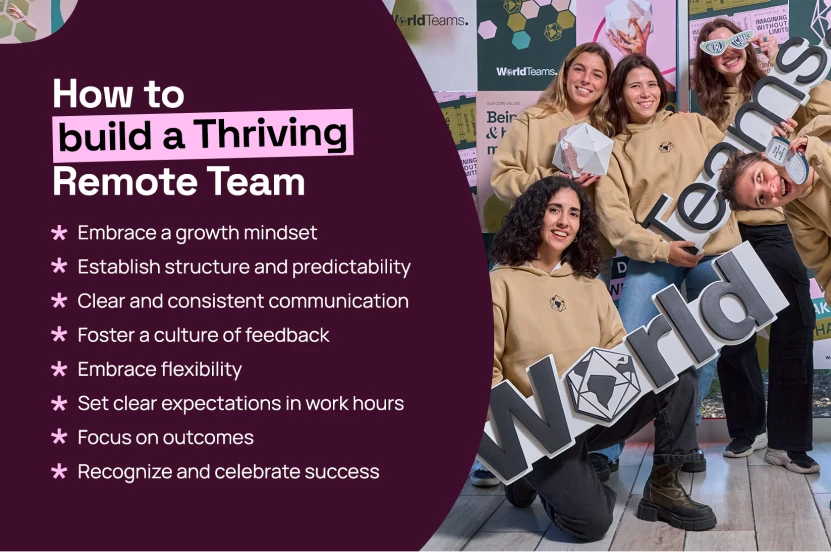Remote Teams: Building Trust and Collaboration in a Distributed Workplace

The landscape of work has undergone a dramatic shift. Remote and hybrid work arrangements are no longer temporary solutions but established realities for many organizations. As companies embrace the flexibility and global talent pool that remote work offers, fostering a sense of team spirit and achieving optimal productivity in a distributed environment becomes paramount. This blog post dives deep into the challenges and rewards of managing remote teams, equipping you with the best practices to build trust, collaboration, and success.
The Challenges of Managing a Geographically Dispersed Workforce
The transition to a remote work model presents unique challenges that require innovative solutions. Here, we’ll explore some of the most common hurdles managers face when overseeing geographically dispersed teams:
Communication and Misunderstandings
Coordinating meetings across time zones can be a logistical nightmare. Lack of face-to-face interaction can lead to misunderstandings in communication, particularly when relying solely on text-based channels. Information overload from email and messaging platforms can further complicate communication and reduce clarity.
Building Team Cohesion and Morale
When team members are scattered across different locations and often work asynchronously, it can be difficult to cultivate a strong sense of team spirit and shared purpose. Remote workers may feel isolated and disconnected from their colleagues, leading to decreased ~ ~ morale and motivation. Additionally, fostering a sense of accomplishment and celebrating team wins becomes a more deliberate process that requires dedicated effort.
Resource Management and Establishing Boundaries
Effectively managing workloads and allocating tasks efficiently becomes more complex in a remote setting. Ensuring clear communication about expectations and deadlines is crucial. Furthermore, establishing healthy boundaries between work and personal life is essential to prevent burnout and maintain productivity for remote workers.
Combating Isolation and Disconnection
Over time, the novelty of remote work can wear off, and feelings of isolation and disconnection can set in. Without the natural social interaction in a traditional office setting, remote workers may struggle to feel connected to their colleagues and the company culture. This can negatively impact morale and engagement.
Building Trust in a Remote Environment
Trust is the bedrock of any successful team. Micromanaging remote employees and failing to empower them can harm building trust. Creating a culture of psychological safety where team members feel comfortable taking risks and sharing ideas openly is essential.

Strategies for Building a Thriving Remote Team
Despite the challenges, managing remote teams can be incredibly rewarding. Here are some key strategies you can implement to build trust, collaboration, and success within your distributed workforce:
Develop a Comprehensive Strategy
Before diving into tactics, create a well-defined strategy for managing your remote team. This strategy should consider your company culture, goals, and the specific needs of your team members.
Embrace a Growth Mindset
The world of remote work is constantly evolving. Be open to new ideas and technologies to enhance communication, collaboration, and team effectiveness. Focus on continuous improvement and adapt your strategies based on feedback and real-world experiences.
Define Your Role as a Remote Team Leader
Your role as a manager requires a shift when overseeing a remote team. Focus on setting clear expectations, providing regular feedback, and fostering open communication channels. Be readily available to answer questions, offer support, and empower your team members with the autonomy and trust they need to thrive.
Establish Structure and Predictability
Like in a traditional office setting, predictability and structure are essential for fostering a productive remote work environment. Create a clear meeting schedule and stick to it as much as possible, ensuring the burden of inconvenient time zones is fairly distributed among team members. Look for ways to structure meetings themselves for efficiency, such as utilizing the EPIC framework (Energy, Purpose, Insights, and Connection) to keep discussions focused and impactful.
Prioritize Clear and Consistent Communication
Communication is the lifeblood of any successful team, which becomes even more critical when managing a remote workforce. Establish a communication plan that outlines the preferred communication channels for different purposes (e.g., Slack for quick updates, email for longer messages, and video conferencing for complex discussions). Regular one-on-one meetings with direct reports ensure they feel heard and supported. Invest in creating well-documented procedures (Standard Operating Procedures or SOPs) that outline key workflows and processes. This empowers team members to find information independently and complete tasks efficiently without asking questions constantly.
Foster a Culture of Openness and Feedback
Create a psychologically safe environment where team members feel comfortable sharing ideas, concerns, and feedback. Actively solicit input from your team on communication practices, work processes, and even company goals. By involving them in decision-making and fostering a collaborative spirit, you can cultivate a more engaged and productive workforce.

Embrace Flexibility
One key benefit of remote work is the flexibility it offers. When scheduling meetings and deadlines, be mindful of individual needs and time zones. Allow team members the autonomy to manage their workloads and work schedules to optimize their productivity and well-being.
Set Clear Expectations Around Work Hours
While flexibility is important, it’s also crucial to establish clear expectations around working hours. This helps to prevent burnout and maintain healthy boundaries between work and personal life. Encourage team members to disconnect after work hours and avoid the temptation to be “always on.” Lead by example and practice what you preach!
Focus on Outcomes, Not Activity
In a traditional work environment, managers might measure productivity based on the number of hours employees spend at their desks. However, in a remote setting, the focus should shift to results and deliverables (outputs) rather than activity. Evaluate your team members based on their work quality, completed projects, and overall contribution to the company’s goals.
Nurture Team Cohesion and Camaraderie
Building a strong team spirit and connection requires deliberate effort when your team is geographically dispersed. Schedule regular team-building and virtual social events to foster camaraderie and informal interaction. Encourage team members to share personal stories and updates during meetings. Consider implementing a “virtual water cooler” concept, similar to Upwork’s Coffee Break feature, where team members can connect and chat about non-work topics. Creating opportunities for social interaction helps combat feelings of isolation and strengthens team bonds.
Recognize and Celebrate Success
Acknowledging and celebrating individual and team achievements is essential for maintaining morale and motivation. Publicly recognize high performers during meetings or through company-wide announcements. Utilize a dedicated Slack channel for peer-to-peer recognition, encouraging team members to celebrate each other’s accomplishments. These small gestures go a long way in fostering a positive and supportive work environment.

Build your Dream Team in just 72 hours
Now you’ve grasped the fundamentals of managing remote teams, you might be itching to build a high-performing team. But finding the right talent can feel daunting. This is where WorldTeams comes in.
We understand that building a successful remote team requires a unique approach. That’s why we offer a solution unlike any other – access to a curated talent pool of the top global professionals across various industries. Imagine collaborating with a team possessing exceptional skills and a deep understanding of the nuances of remote work.
Grow your team and reduce costs with WorldTeams.

1. Top 3% of Talent
We connect you with the cream of the crop. Our rigorous selection process ensures you have access to pre-vetted professionals who consistently deliver exceptional results. (Just like our dedicated account managers who provide seamless support throughout your hiring journey!)
2. Cost-Effective Solutions
Building a dream team shouldn’t break the bank. WorldTeams offers competitive rates, ensuring you get the best value for your investment. (We understand the importance of building a team that fits your budget and project needs.)
3. Dedicated Support
You won’t be left navigating the team-building process alone. A dedicated account manager will be by your side throughout, providing guidance and support at every step. (Similar to how we prioritize clear communication with our remote talent pool, our team is here to answer your questions and guide you through the hiring process.)
4. Seamless Communication
Communication is key. Our talent pool is comfortable working in remote environments and excels at clear and efficient collaboration across time zones. (We understand the importance of fostering a culture of open communication within your remote team, just like our team prioritizes clear communication with you.)
5. Cultural Understanding
Cultural diversity can be a strength for a remote team. WorldTeams connects you with a global talent pool that can bring various perspectives to your projects. (Building a successful remote team requires understanding and appreciating diverse backgrounds, similar to how our team is here to ensure a smooth onboarding experience for your new hires.)
With WorldTeams, you don’t hire individual talent; you gain a trusted partner dedicated to helping you build a high-performing remote team that achieves exceptional results. Contact us today, and let’s start building your dream team together.









